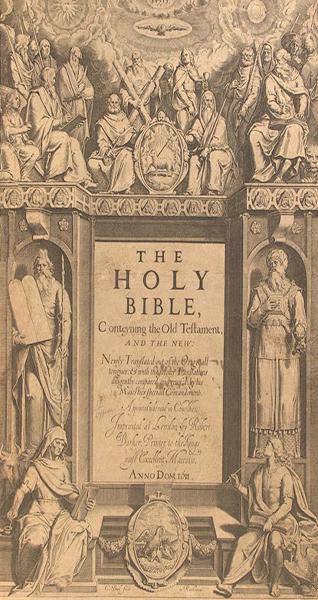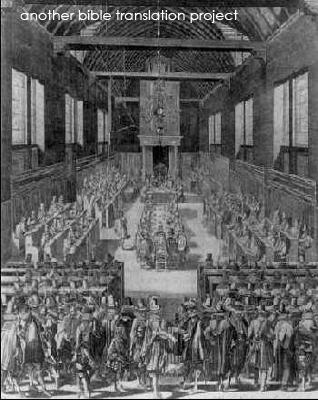Columnists
What Can We Learn From King James?
by MICHELE GIBSON
EDITOR: Three centuries after the investiture of the final compilation of the Adi Granth as our living, perennial and only Guru; and more than a century after Sikhs in large numbers began to make their home in different parts of the globe, we as a worldwide community are face-to-face with two crucial questions:
First, do we need a 'definitive' translation of the Guru Granth Sahib in the lingua franca of much of humanity today - namely, English?
A number of good translations are now freely available, not only in English, but also in many of the world's major languages. But there is general consensus that a more ambitious and collective project needs to be undertaken to produce a 'King James' -style version - if I may be allowed to use the term as an adjective - which captures the meaning and message, beauty and poetry, song and music, mysticism and spirituality, of the original 1430 pages ... as far as it is humanly possible ... in the full glory of the English language. Not to replace the original in any way whatsoever, but to provide an aid, a key, a door, an introduction - to the endless riches of the Guru.
Second, how do we go about it?
Before we even begin to seek the answers, we need to understand the ambit and import of the questions themselves.
The exercise we will invariably have to embark upon is not entirely novel or unique to the human experience. As already alluded to above, we have the precedent of the renowned 'King James' translation of the Christian Bible - one of several such ventures - which was undertaken around the very time that Guru Arjan set about to compile the Adi Granth.
The 'King James' project was plagued by every human weakness and challenge imaginable: ego, arrogance, ambition, selflishness, politics, power-play, fraud, betrayal, dishonesty - all were present in the mix. And so were the best traits of human nature: dedication, commitment, scholarship, selflessness, spirituality, mysticism, and the desire to serve God and the greater good.
The result - though it took seven long years and forty-eight souls to tackle the usual hurdles and minefileds - was finally accomplished in 1611, when it was released with considerable pomp and ceremony by King James, at whose behest the job had been undertaken.
And it was a masterpiece. It is, four centuries later, arguably the greatest work in the English language. It guided Shakespeare's pen and, even today, it shapes the way you and I wield the English language.
Michele Gibson has studied the early 17th century King James project in detail and has compiled for us hereunder a brief history of the said translation.
It is not a process that can be or should be emulated in its entirety, but the summary below will enlighten us on the challenges we face if we do embark on this journey. Can we mimic some of the steps and stages and, at the same time, avoid the pitfalls?
WHAT CAN WE LEARN FROM KING JAMES?
Translation is more than a function of identifying the equivalency between the words that represent external phenomena. Words themselves range in their ability to stand in for 'things' versus 'ideas' versus 'indescribable being'. In addition, language is alive, it ages, matures, grows and prunes. Yet our most important needs, collective consciousness, regard for the earth, or faith, are difficult enough to convey in a mother tongue, let alone find synonymous substitutes for them in a second language.
The King James Bible was not the first attempt to translate words from ancient languages, Hebrew and Greek, into similar words in a fledgling English. The translators were advised to freely utilize synonyms in order to advance the new language. They were encouraged to consult earlier English translations to achieve this, and they did. The Geneva bible, the Tyndale bible and the Coverdale bible all served as references for the task.
The translators themselves were a mixed group of academics and clergy, many with experience in teaching or preaching in Hebrew or Greek; poets, orators and philosophers by hobby, and eventually, on a stipend from the crown. Their own agendas and interpretations were constricted by their need to collaborate and compromise. Heavily edited and scrutinized by bishops, the privy council and by King James himself, and with the Archbishop of Canterbury secretly reviewing/ revising the end result, the 'Authorized Version' is, in a way, a pre-authorized one.
Before the translation work began, the group responsible were read the 'rules' on the expectations for the work which was to come. The translators were separated into groups, assigned readings, and set about their task, and the task took many years. In the pulpits, the bishops encouraged anyone with extensive knowledge in the area to submit their comments, concerns, and insights. For the academics, the work of teaching was sidelined for the new role. The translation is, in theory, inspired by a democratic process with a grass roots call for submissions.
The end result is an inspiring scripture and a work of literature that ultimately becomes a classic. This may be due to the beauty of the original work and the assumption that the translators got it right, every time. It may be as a result of sheer slogging, day and night, and such commitment that their sincerity augments every line. It may be that it is impossible to corrupt a book that has been inspired by God!
What is more likely though is that there was enough mature acquired knowledge at the table and in the field, and, though confined by a number of prescribed restrictions on academic freedom, enough raw intention and genuine love for the work in its original form that they knew, intuitively and collectively, what they were reaching for. The bible moves the soul to reach for a sense, and an entity, which is uplifting and humbling, inspiring and supporting, heart breaking and earth shattering at the same time. Surely, when one has been moved to faith, one remembers where it was that it took you, in any language.
The translators all hailed from the same general region. They may also have been selected for the moderation in their views. What results is a moderate interpretation, in a fairly homogenous dialect with the cadence of the sermon of a puritan preacher; the work referenced most often was the Geneva bible - the bible inspired by the presbyterian break away from the Church of England. From the perplexing and mystic hands of the bishops, and the Bishop's Bible, into the longing hands of the average citizen, comes the King James Version.
Inspiring poets and writers for centuries to come, unifying the language of four distinct nations and placing the bible into the hands of the masses, the King James Version displaces the Bishop's bible and the Geneva, but not without the backing of law, and the threat of treason.
But can scripture be translated into different languages under such limitations? What is lost if you strive for moderation? Does the moderate view actually grapple with and solve the doctrinal issues or is it just practical to try to please as many as possible? The work may be beautiful due to the sincerity of the translators and the voice of the original work, but does it achieve truth? Is truth to be achieved through scripture if scripture is buoyed by metaphor to inspire rapture, or does a concrete equivocation between languages reduce its mystical value?
The idea for the translation of the King James bible and the limits placed on the people responsible for it are interesting in and of themselves; politics, economics and ego all play a factor in this remarkable book, which - remarkably - resulted in a masterpiece. The inspiration of God and the sincerity of the goal is believed to elevate the work above the human limitations and, with the spread of English, it eventually inspires many more than the Hebrew and Greek original.
The desire to keep scripture accessible to as many as possible is inherently good, and if there is a cost in the process, hopefully the truth is so vast and fundamental that it beams through, regardless of the incidental symbols we choose to transport the sound of any given language.
April 6, 2010
Conversation about this article
1: Brijinder Singh (New York City, U.S.A.), April 06, 2010, 11:18 AM.
I completely agree that there needs to be a definitive English translation of the Guru Granth Sahib. I think that the Guru's message should be spread globally, and not just kept to ourselves. It will also help the children who were raised in the diaspora to become better acquainted with the essence of Sikhi. This task should undoubtedly be undertaken, most preferably by the artists, authors and scholars from our communities in the diaspora. I say from the diaspora because I do not have full confidence that the Sikh authorities in India will give an honest translation of the scripture. There are too many shady political dealings and corruption within the S.G.P.C. to warrant any faith that they do not have their own personal interests in mind, as was shown with the recent revisions to the Nanakshahi Calendar. If I were to nominate a body to undertake this important task, it would surely be the editors and contributors of Sikhchic.com. I have always been a fan with how beautifully the Guru's words are translated in the Talking Stick Colloquium and in the daily quote from Guru Granth Sahib.
2: Harvind Kaur (Chicago, U.S.A.), April 06, 2010, 2:00 PM.
All translations are inherently flawed. The issue of translation is complex and fraught with difficulty. There are multiple issues relating to translating from one language to another - issues of translating the structure, translating the linguistic complexities, translating the idea, translating the intent, etc. I understand the strong desire by many to make the Guru Granth Sahib more accessible to many people. However, letting there be many possible translations seems to me to be the more proper approach. Giving a stamp of approval to just one translation limits the possibilities. I am still of the strong belief that the Guru Granth Sahib will only truly be accessible to those who delve into it in the original Gurmukhi. Sikhism is an individual journey with a collective soul. Each individual will grasp, understand, appreciate different shabads differently as they proceed through life. This too is an act of translation. When I think of translation, I am reminded of the childhood game we've all played - Telephone. So it starts with one person who is told something which is repeated until we get to the last person. By the time the last person verbalizes the message, it is invariably all wrong. So let us be weary of what is lost in translation!
3: Harinder (Bangalore, India), April 06, 2010, 2:28 PM.
1) First - Let Guru Granth Sahib ji be translated for the masses in all languages men speak. Help of Sikhs in different countries could be taken, e.g. Germans Sikhs for German, Spanish Sikhs for Spanish, etc. 2) Second - Let the translation work be revisited every few decades, to make further inroads into getting a deeper insight and understanding into this priceless treasure of mankind.
4: M. Gibson (Guelph, Ontario, Canada), April 06, 2010, 3:07 PM.
Yes, very good point, Harinder ... to revisit and review!
5: Sangat Singh (Kuala Lumpur, Malaysia), April 06, 2010, 7:24 PM.
'Ayvad oochaa hovai ko-ay tis oochay ka-o jaanai so-ay' - 'Only one as great and high as God can know His lofty and exalted state [GGS:5.10]. Principal Satbir Singh, in one of his books, wrote that once Sikhs approached Guru Arjan and requested that he should now provide a commentary to the Adi Granth as well. Guru Arjan's reply was that let the Sikhs do so from time to time, according to their own experience, understanding and state of their 'awasthaa' - consciousness. Any translation, no matter how good or authorized, cannot be the last word. King James translation still isn't. 'Tayray kahnay kee gat ki-aa kah-o o mai bola thee bhad laaaj/ Raam jeh paa-aa raam tay bhavay na baarai baar'. - 'What should I say about the reality of your talk? I am embarrassed even to speak to you/ One who has found the Lord does not wander from door to door.' All of us have this experience, while doing paatth or listening, one day suddenly a line hits you like a ton of bricks and opens a door that we never knew. This has happened due to His Grace (gurprasad), which takes you a notch higher. Translations should continue but don't aim for the last word or declare it as an authorized version and certainly not from the S.G.P.C. Let every translation of the Guru's Word take you a step forward.
6: Gurjender Singh (Maryland, U.S.A.), April 06, 2010, 9:56 PM.
Now Sikhs are global citizens. This is the best idea - to come up with a simple and universal translation. Just as an example: In Asa ki Vaar, Guru ji used the words 'kolhu', 'charkha' and 'chakki. Some people born and living abroad have never come across those items or words. Their real meaning should be used in translation so that it should be understood without knowing these words. I believe I read that S.G.P.C. refused to give permission to publish this kind of translation. On the other hand, during the 400th anniversary of Guru Granth Sahib ji, Sikhs did a lot of parading around in processions, but once again simply failed to explain to others the treasures contained in the Guru Granth. [EDITOR: We don't need an official or authorized translation. All that is being suggested by some is that there should be a more elaborate and systematic process to produce a better translation than those currently available. We DO NOT need an authorized version like King James' - but we could learn from the process they followed.]
7: Harjitpal Kaur (Birmingham, United Kingdom), April 08, 2010, 5:59 PM.
I think it is an excellent idea - to put together a team independent of the mahants in India - to get a top-notch translation under way. Sure, it shouldn't be an authorized or official version - there is no reason to have one, even if there was someone or some institution that had the commitment and integrity to give it the stamp. This should be a seva taken on by a handful of scholars who will work closely with writers, poets and academics ... and come up with a work of art. It will certainly not come anywhere close to the original, but our inability to attain perfection should not deter us from the journey. We'll all learn and benefit from the process. Thank you, Michele, for raising the idea in such a thoughtful manner.
8: Aryeh Leib (Israel), April 14, 2010, 7:13 AM.
A translation that more accurately reflects the original meaning is certainly something to be desired - but is a second-best solution, at best. Even the best translation will always fail to capture the subtle nuances, poetry, and shades of meaning of the original language. This is all the more so for verse which is meant to set to music. Let such effort be accompanied by a concerted effort among the Sikh Diaspora to learn/ improve their knowledge of Gurmukhi - and to propagate the notion that one who doesn't know it is, for all practical purposes, a Sikhi illiterate! Translation should be seen as a temporary necessity - no more.






